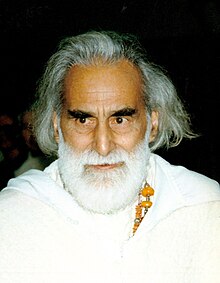This article has multiple issues. Please help improve it or discuss these issues on the talk page. (Learn how and when to remove these messages)
|
| Vilayat Inayat Khan | |
|---|---|
 | |
| Personal life | |
| Born | 19 June 1916 |
| Died | 17 June 2004 |
| Senior posting | |
| Disciples | |
Vilayat Inayat Khan (19 June 1916 – 17 June 2004) was a teacher of meditation and of the traditions of the East Indian Chishti Sufi order of Sufism. His teaching derived from the tradition of his father, Inayat Khan, founder of The Sufi Order in the West (now named the Ināyati Order), in a form tailored to the needs of Western seekers. One of his sisters was Noor Inayat Khan GC MBE. He taught in the tradition of Universal Sufism. His parents met at the New York City ashram of American yogi, Pierre Bernard, half-brother of his mother Pirani Ameena Begum.
Prior to his teaching career he worked in London as an assistant to Ghulam Mohammed, the Finance Minister of Pakistan in 1949, and served as a personal assistant to Pakistan Prime Minister Liaquat Ali Khan during his visit to England.
In 1975 he founded the Abode of the Message, which serves as the central residential community of the Sufi Order International, a conference and retreat center, and a center of esoteric study.
Legacy
During his lifetime Vilayat Inayat Khan was instrumental in the founding of several organizations that continue to operate today.
The Institute for Applied Meditation
Death
Vilayat Inayat Khan died on 17 June 2004, two days before his 88th birthday. His son is Zia Inayat Khan. His Dargah is located in Delhi, India.
Bibliography
- Inayat Khan, Pir Vilayat (2014) The Ecstasy Beyond Knowing: A Manual of Meditation. NY. Omega Publications ISBN 1941810012
- Inayat Khan, Pir Vilayat (2011) Life is a Pilgrimage. NY. Omega Publications ISBN 0930872819
- Inayat Khan, Pir Vilayat (1974). Toward the One. New York: Harper and Row. ISBN 978-0-06-090352-7.
- Inayat Khan, Pir Vilayat (1978). The Message in Our Time: The Life and Teaching of the Sufi Master, Pir-O-Murshid Inayat Khan. San Francisco: Harper and Row. ISBN 978-0-06-064237-2.
- Inayat Khan, Pir Vilayat (1978). "Front matter: Forward". In Khan, Hazrat Inayat (ed.). The Complete Sayings of Hazrat Inayat Khan. New Lebanon, NY: Sufi Order Publications. ISBN 978-0-930872-02-1.
- Inayat Khan, Pir Vilayat (1981). The Call of the Dervish. Santa Fe, NM: Sufi Order Publications. ISBN 978-0-930872-26-7.
- Inayat Khan, Pir Vilayat (1982). Introducing Spirituality Into Counseling and Therapy. Santa Fe, NM: Omega Press. ISBN 978-0-930872-30-4.
- Inayat Khan, Pir Vilayat (1994). That Which Transpires Behind That Which Appears. NY: Omega Publications. ISBN 978-0-930872-49-6.
- Inayat Khan, Pir Vilayat (1999). Awakening: A Sufi Experience. New York, NY: J.P. Tarcher/Putnam. ISBN 978-1-58542-038-4.
- Inayat Khan, Pir Vilayat (2003). In Search of the Hidden Treasure: A Conference of Sufis. New York: J.P. Tarcher/Putnam. ISBN 978-1-58542-180-0.
References
- "BERNARD, VIOLA WERTHEIM, 1907-1998" (PDF). Library-archives.cumc.columbia.edu. Retrieved 23 May 2017.
- Horowitz, Mikhail (2018). Illumination The Saga of a Spiritual Master. Mikhail Horowitz. pp. 46–50. ISBN 978-1732102903.
- Harper, Claire Ray (2011). We Rubies Four. NY: Omega Publications, Inc. pp. 147–149. ISBN 978-0-930872-84-7.
- Sutton, Robert P. (2005). Modern American Communes: A Dictionary. Westport, CT: Greenwood Press. pp. 3-4; ISBN 978-0-313-32181-8.
- "The Pir Vilayat Center For Meditation and Retreat". Abode of the Message. Retrieved 30 March 2023.
- "Founder | Hope Project". hopeproject.nl. Retrieved 30 March 2023.
- "History". eomega.org. Retrieved 30 March 2023.
- "iamHeart Home". iamHeart. Retrieved 30 March 2023.
- "Pir Vilayat Inayat-Khan, 87, Sect Leader". The New York Times. 22 June 2004.
- "Pir Vilayat Inayat Khan | Teachers | Spirituality & Practice". www.spiritualityandpractice.com. Retrieved 27 November 2018.
This biographical article about a person notable in connection with Islam is a stub. You can help Misplaced Pages by expanding it. |